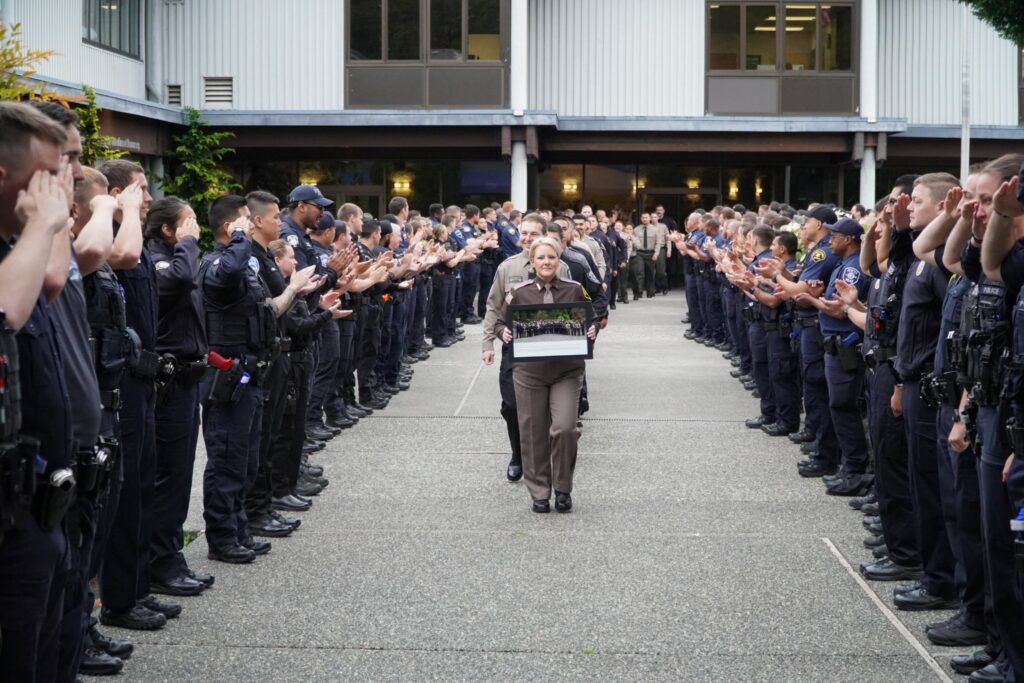
Washington’s finest! New police recruits from across our state graduate from the Washington State Police Academy in Burien Washington in June 2022. The Washington legislature is currently working on new ways to sue police academy graduates if their training proves inadequate.
Washington legislators are in charge of police training in our state, but they want to sue officers and cities, and not themselves, when this training lets the public down. Note these police officers can already be sued today if they are acting in bad faith.
To hear some state legislators complain about police officer training, you might never know that the legislature itself has been in charge of overseeing the training of these new officers for the past 50 years. Since 1974, every new officer gets 720 hours of training in the state police academy, overseen by the Washington State Criminal Justice Training Commission (WSCJTC). Cities pay them for this service. The training covers all the necessary basics, including what they need to know about criminal law and the state constitution, using tasers and firearms, chasing suspects, conducting traffic stops, and other necessary skills. Here is the syllabus. The WSCJTC also provides numerous specialty follow-on classes, in such varied areas as dog handling, accident reconstruction, and police supervision, so the WSCJTC maintains a lifetime role in training police officers. The WSCJTC reports directly to the governor and legislature, not to local mayors or city council members. So individual legislators only need to look in a mirror to see someone responsible for police training.
This month the legislature is focussed on developing a way that people can sue these police officers when police training proves inadequate– either because the training failed to cover a unique legal or crisis situation the officer found themself in, or because the training directed the officer to make a wrong decision. The new legislation, HB 1025, is artfully written to still preserve immunity from lawsuits for the State and the legislators, the ones overseeing the academy classes. Only the police-officer students and their employers will be sued when the state training turns out to be inadequate.
Can you imagine how you would feel if you learned that a college or school where you earned a degree was trying to get you sued because the education they gave you was inadequate? How angry would you be? That’s what the legislature is cooking up for our police officers.
Thanks to our tumultuous legislature, new legal dilemmas are presented to officers everyday. For example, should an officer run after a suspect that just sold a lethal dose of fentanyl to a 12-year-old? What happens if the suspect runs into traffic, and is killed? With drug-related criminal issues still unresolved, an officer would need to be an experienced trial lawyer to get every one of these questions right all the time. 720 hours of academy time and 24-hour annual follow-ups will not provide a blueprint for every situation. Right now, when society sends an officer into danger, the officer is expected to act in good faith in applying their judgement and their training to the most confusing situations. If the state feels our officers don’t have enough training to cover all situations, the state should improve the training– not look for ways to financial harm the officers’ families after damage is done. And if anyone feels the officers are acting in bad faith, the officers can already be sued.
In any large workforce there will statistically be a few employees that do bad things, and they need to be dealt with. Police departments are no exception. Officers can currently be reprimanded and demoted for lesser transgressions, and criminally charged for serious offences. Officers can already be sued today under RCW 9-46.212 when they act in bad faith or gross negligence. If the State wants to now sue someone for inadequately training police officers, they should start by suing themselves until they learn to take responsibility for their own work.
Cities do have responsibility to give at least 24 hours per year continuing training to officers, set a safe culture, and provide supervision. Renton far exceeds these expectations with our own dedicated training center employing techniques and culture taught by the WSCJTC as a guide, and enrolling promoted officers in continuing WSCJTC training at their academy campus. Cities also have an overall responsibility to remedy financial damages to other parties that their actions have caused, whether by the police, parks, transportation, or any city department. In Renton our insurance fund typically covers damages caused by police work without requiring a lawsuit from a resident to make it happen. I always advocated for a timely financial remedy and sincere apology to any parties inadvertently harmed by any of our departments.

Recent Comments